Njamito Goes Fairtrade for Cocoa and Vanilla
March 31, 2025Njamito is now Fairtrade certified for cocoa and vanilla! Here’s what that means for farmers, the planet, and the values behind our meal-in-a-bottle.
Read articleWe wanted to see if our assumptions about who’s going to be hyped for Njamito were correct. Here’s how we went about it and what we found out.

When you’re working on something new and exciting as intensely as we have on our meal in the bottle concept, you tend to get lost in the little details and lose sight of the big picture. That’s why it was important for us to let it loose in the wild as soon as possible in order to see if our excitement was warranted. So, we decided to hand Njamito out for free at a couple of summer festivals before the official launch in October.
When you work in a data-driven company where everything has to be measured, quantified, and analyzed you don’t just hand stuff out and determine if it’s a success by gauging peoples’ facial expressions. That’s why we came up with the idea of turning the existing traceability QR code on our bottles into a short questionnaire which could potentially give us some valuable insights.
Now obviously, the first thing we wanted to see is how people would react to how Njamito looks, feels, and tastes, but we also wanted to check if Njamito will tickle the fancy of certain types of people we wanted to reach. The QR questionnaire seemed like the perfect tool to do just that.
Of course, we did our homework way before we got to this point by conducting a series of sensory tests, focus groups, and market analyses. On paper, Njamito seemed to be the ideal solution for active urbanites in their late 20s to early 40s, with a slight majority of them being women. This was going to be our big rubber-meets-the-road moment. We were finally going to find out if our hunches were on point.
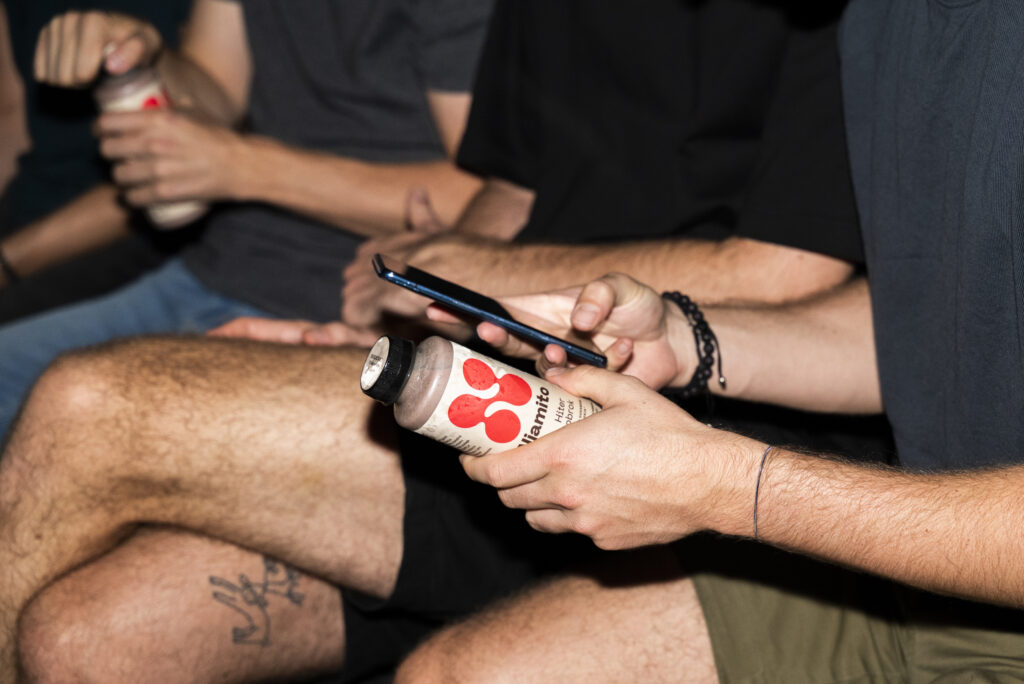
First, we made a list of all relevant summer events happening in our neighborhood. We’re talking about music festivals, sporting events, cultural happenings, family-oriented festivities, and more. Out of all these, we picked a handful of events we thought really resonated with the types of people we assumed were going to like the product. After some back and forth, we agreed to send Njamito to three very different affairs: a chill music and arts festival, an acrobatic extravaganza, and a niche open-air film festival.
We contacted the organizers, made a big batch of Njamito bottles, and arranged for a couple of chummy guys and gals to distribute them at the events. But there was a problem – the QR questionnaire idea was good, but we were pretty sure people wouldn’t be scanning the QR code out of sheer curiosity. So, we decided to give them an extra nudge by offering a reward – everyone who scanned the QR code and completed the questionnaire would be eligible to get a free Njamito bottle upon their first online purchase. All that was left was to design stickers with a call to action, place them on the caps, and hope people would notice.
It was the height of the summer festival season and it was on. Njamito would make its big debut at the Floating Castle Festival taking place in the countryside about an hour’s drive from Slovenia’s capital Ljubljana. The festival is famous for its laid-back vibe, magical atmosphere, and a kaleidoscopic program ripe with plays, street performances, and musical acts that attract a diverse crowd of fun-loving attendees.
The reasons we picked Floating Castle for Njamito’s debut were three-fold:
Over the course of one (long) day, promoters distributed over 900 Njamito bottles to peckish festival-goers. The good news was that almost everybody who tried Njamito had good things to say about it, but we had a little trouble getting people hyped about the QR questionnaire – we hoped at least 10% of the them would scan the QR code on the bottle, but it turned out only 8% were willing to whip out their smartphone to take a look.
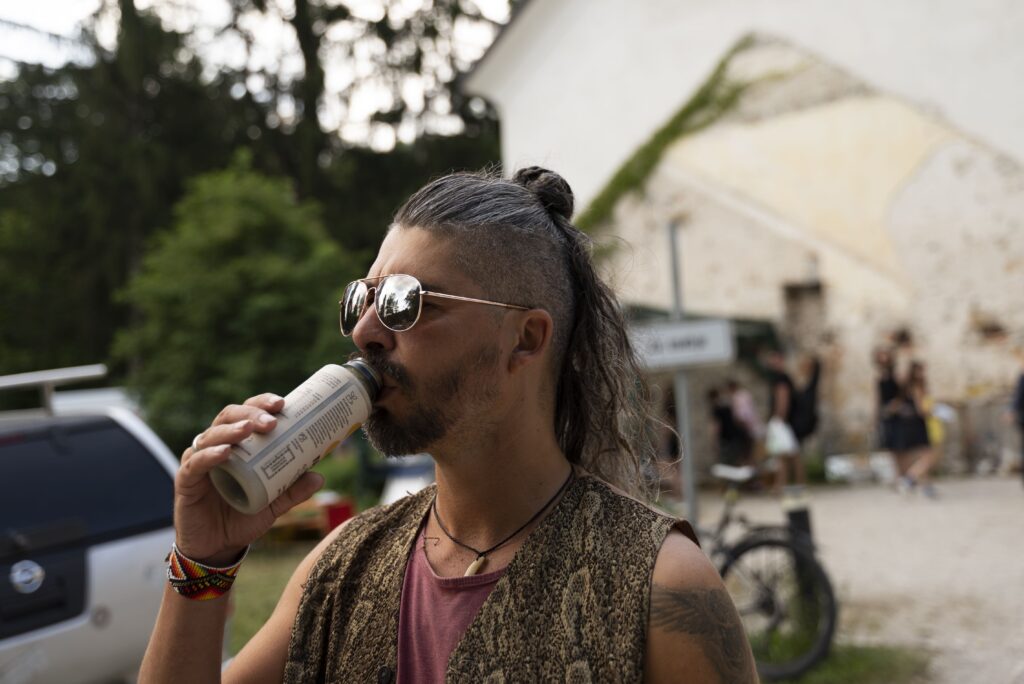
Given the nature-first philosophy of the event with most people leaving phones in their tent (and some even actively going digital cold turkey), the result was far from a complete disaster. The main thing we were interested in figuring out was whether the bottles landed in the hands of people we considered to be our ‘Njamito tribe’ based on preliminary research. Luckily, enough questionnaires were completed to assess this with a degree of certainty.
The Floating Castle attendees were older than we had expected, with the average floating (get it?) in their late 30s which confirmed the more family-oriented setting of the event. We achieved the desired gender balance, but a slight majority of people were based outside of Ljubljana. This was anticipated due to the location of the event. Unfortunately, this means that these specific Njamito-tasters will have a harder time getting their hands on our bottles (in the first phase Njamito will only roll out in Ljubljana).
Next on the summer event list was Odbito, a dunk-contest happening in the heart of Ljubljana. This was the loudest and most commercially-oriented event Njamito would be attending this summer. The stands were jam-packed, the crowd was hungry for a show, and the athletes were more than willing to give them one they wouldn’t soon forget.
This time around, we handed out 400 bottles, mostly around the entrances to the stands. Pretty soon it became obvious that our QR questionnaire would find it difficult to compete with the spectacle taking place on the court.
To complicate things further, a good chunk of the onlookers were tourists casually dropping by to see what all the fuss was about, while sightseeing Ljubljana. We wanted to avoid giving Njamito to people who wouldn’t be able to get it once it launched, but we weren’t really in the mood to discriminate, so inevitably some bottles ended up in the hands of foreigners who probably didn’t get the QR memo.
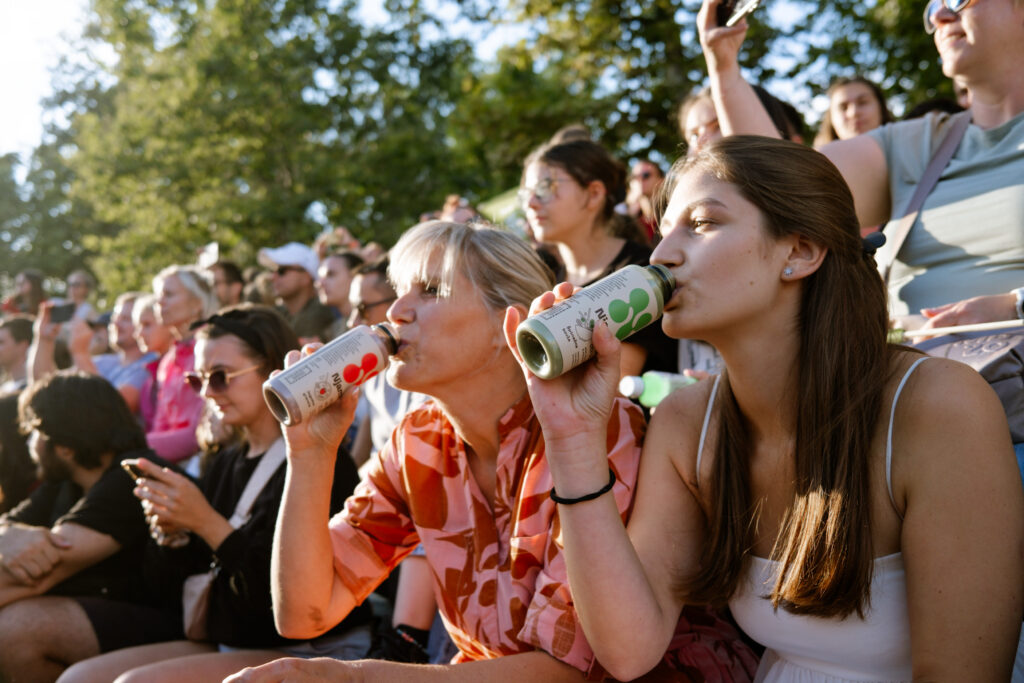
Still, more than 10% of the bottles we handed out had their QR code scanned, and we gained some valuable feedback. Our bottles ended up in the hands of exceedingly young people, the relative majority being in their early 20s. Most attendees were from Ljubljana, which meant that their curious questions about Njamito’s launch would probably turn into webshop purchase clicks. This time our colorful bottles attracted higher percentage of women compared to Floating Castle.
The last event on our list was a short film festival called FeKK with projections taking place at different venues around Ljubljana. Intimate, local, and very niche, it was the smallest and last stop of Njamito’s summer tour. We decided to make an entrance at Thursday’s open-air projection on the Museum square that featured competition entries from Slovenia and the Balkans.
Over the course of the evening, 100 bottles were handed out to movie-goers. It turned out they weren’t just hungry for entertainment as our stock for the evening ran out well before the projection was over. The lack of nearby food options proved to be a boon for Njamito and it probably didn’t hurt that the host announced our presence before the projection and during the break.
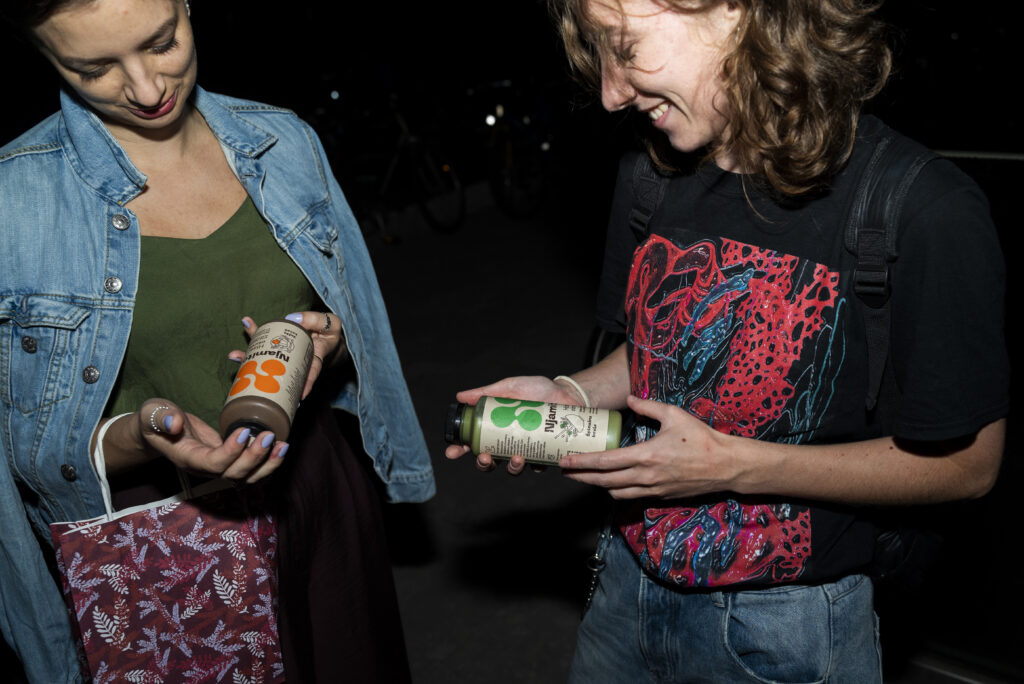
The combination of all these factors made FeKK the most successful event in terms of QR code scans. The trend of more women opting to try Njamito continued – this time they represented a whopping 70%. This might have reflected the general FeKK-goers’ demographic, or some elements of either the product or our philosophy (and we know from world trends that women are more likely to support and be involved in sustainability-based activities). FeKK also had the most age-diverse visitors. We distributed our bottles to people aging from 18 to 50 and over.
Across the events, women made up the majority of Njamito enthusiasts, representing 58%, which might be a testament to the attraction of our product or perhaps the broader trend of females leaning into sustainable endeavors. Age-wise, the attendees were predominantly young adults; about a third were between 25-34 years old. Interest in Njamito wasn’t confined to Ljubljana, with 60% of attendees hailing from the city and 40% residing elsewhere.
In terms of event popularity, Odbito led the charge with 45% of attendees, shedding light on its massive appeal or perhaps the timeliness of its schedule. Floating Castle, with its family-oriented appeal, attracted 35%, while FeKK, with its diverse age range, captured the interest of 20% of the total attendees. This blend of demographics across events underscores the universal charm of Njamito and hints at its potential to resonate with a wide array of diverse individuals.
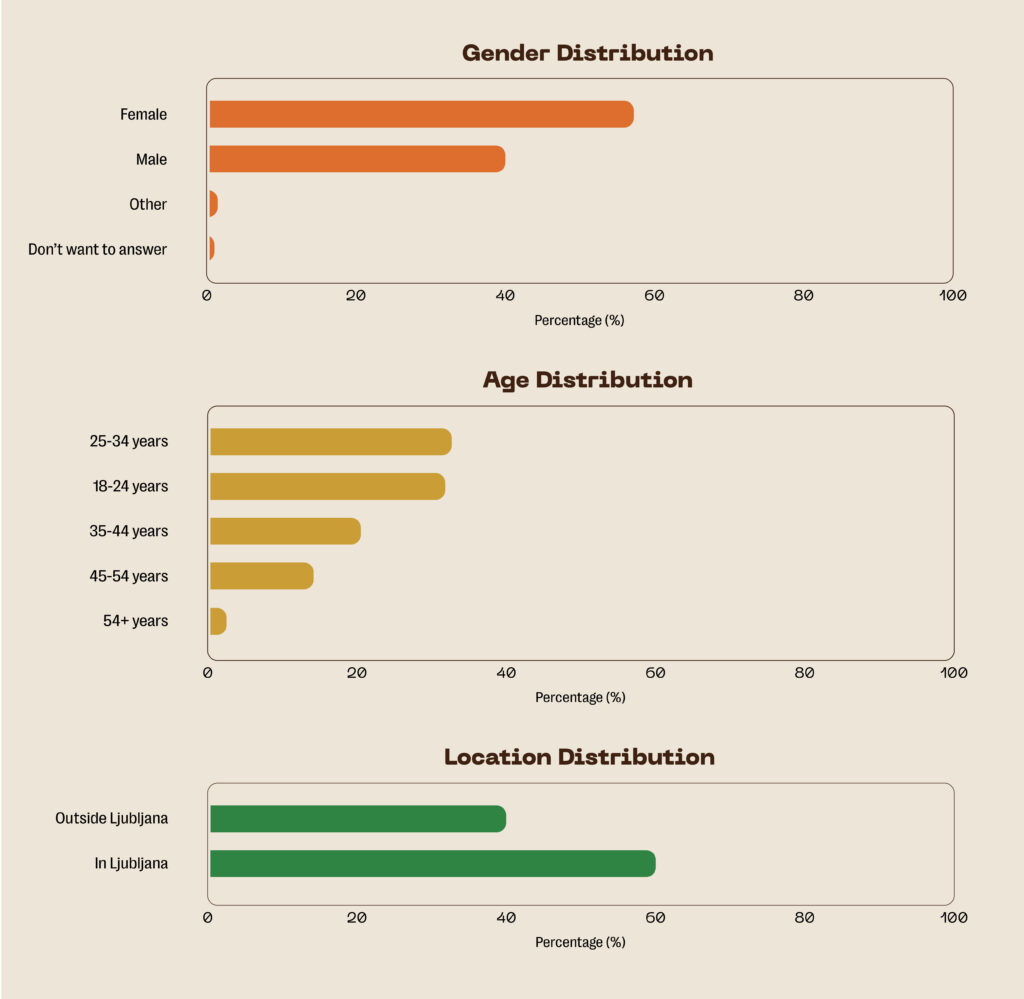
This little experiment is just the beginning. We already have a few new events lined up for Njamito in the fall. This time only one of them – a mountain-bike competition – will take place outdoors as we shift our focus to business-themed gatherings and stumble into the fascinating and complex world of B2B.
Stay tuned for more trials, tribulations, and –- hopefully –- triumphs.
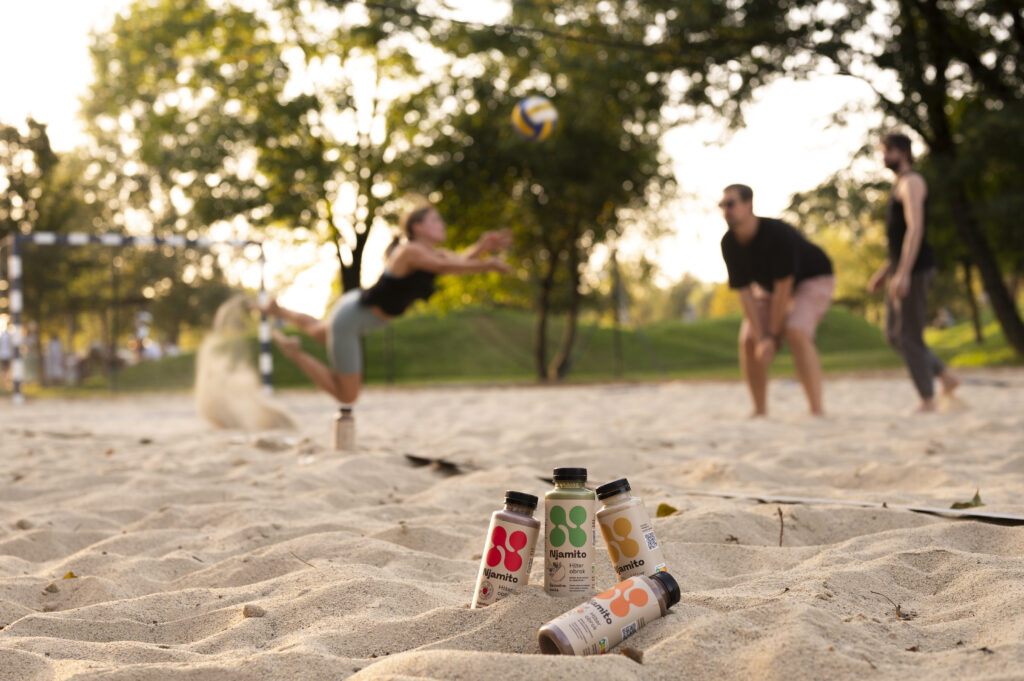
Njamito is now Fairtrade certified for cocoa and vanilla! Here’s what that means for farmers, the planet, and the values behind our meal-in-a-bottle.
Read articleIdealism met reality as we launched our meal-in-a-bottle, Njamito. After 100.000 bottles sold, here’s what we learned about organic food and market adaptation.
Read articleWith organic seeds in short supply, we launched our own organic seed production journey to secure sustainable farming practices.
Read article